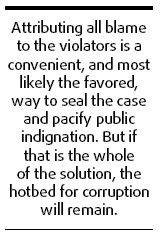Editorials
Thieves from within
(China Daily)
Updated: 2010-02-03 07:49
 |
Large Medium Small |
A thief in the family is hard to detect. It would be harder when thieves gang up.
The latest clutter of thieves caught in the southwestern Yunnan province's financial bureaucracy is raw proof that the biggest threat to State coffers lies within the system. And of how rampant corruption can become in the absence of oversight.
Over the years, a number of local financial caretakers from the provincial, prefecture and county levels have colluded to swindle State money with non-existent "projects", embezzle government allocations and collect kickbacks for financial support granted. Millions of yuan, earmarked largely for poverty alleviation, has instead ended up flowing into their private accounts.
| ||||

The awarding of State money slated for fabricated "planting projects" that wound up purchasing private villas reveals a de facto state of anarchy inside some local financial systems. Local authorities should congratulate themselves if the recently convicted few are the only perpetrators to have taken advantage of the system.
The authorities have developed a harmful habit of not examining the system when things go wrong. When a scandal breaks, they are quick to point at an abusive few and clarify that the incident was an "isolated" case.
A blanket of blame on the system's shortcomings may be too arbitrary and unfair. But the Yunnan case does show the same loopholes found responsible for similar scandals. Attributing all blame to the violators is a convenient, and most likely the favored, way to seal the case and pacify public indignation. But if that is the whole of the solution, the hotbed for corruption will remain. It will be a matter of time for us to see new broods of financial thieves from within the system.
A lot can be done to install effective supervision over the operation of local financial authorities. Technical adjustments in procedures, for example, can substantially raise the cost of abuse.
But a more obvious task is to increase transparency. People's lack of access to information about how public money is being spent is a direct cause of the audacity of the corrupt elements. The corrupt would have to restrain their horns knowing that they are being watched.
(China Daily 02/03/2010 page8)













